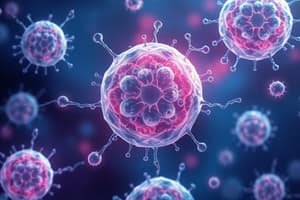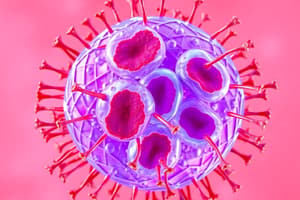Podcast
Questions and Answers
Which statement accurately describes the properties of solids?
Which statement accurately describes the properties of solids?
- Solids flow freely and adopt the shape of their container.
- Solids do not change volume and cannot be compressed. (correct)
- Solids can change volume and are easily compressed.
- Solids can flow and change shape.
How do liquids differ from gases in terms of volume and compressibility?
How do liquids differ from gases in terms of volume and compressibility?
- Liquids do not have a fixed volume and can easily change shape.
- Liquids have a variable volume and can be compressed.
- Liquids can be compressed, while gases cannot.
- Liquids have a fixed volume and cannot be compressed, whereas gases do not. (correct)
What property allows gases to fill the shape of their container?
What property allows gases to fill the shape of their container?
- Gases are compressible and their particles are in random arrangement. (correct)
- Gases maintain a fixed shape.
- Gases have a regular arrangement of particles.
- Gases do not possess volume.
Which characteristic is common to both solids and liquids regarding their volume?
Which characteristic is common to both solids and liquids regarding their volume?
Which statement about the flow of matter is true?
Which statement about the flow of matter is true?
Flashcards are hidden until you start studying
Study Notes
Specialised Cells
- Specialised cells are designed for specific functions within an organism.
Red Blood Cells
- Function: Transport oxygen throughout the body.
- Features: Bi-concave shape allows for maximum surface area for gas exchange; lacks a nucleus to accommodate more hemoglobin.
Sperm Cells
- Function: Responsible for fertilizing egg cells.
- Features: Possesses a flagellum (tail) that enables motility towards the egg.
Ciliated Epithelial Cells
- Function: Move mucus out of the respiratory system.
- Features: Abundant mitochondria provide energy; finger-like projections (cilia) help waft mucus upward.
Egg Cell (Ovum)
- Function: Combines with sperm to create a zygote.
- Features: Has a protective slime coat; cell membrane hardens after fertilization to prevent multiple sperm entry.
Palisade Cells
- Function: Conduct photosynthesis in plants.
- Features: Packed with chloroplasts, maximizing light absorption needed for photosynthesis.
Root Hair Cells
- Function: Absorb water and minerals from the soil.
- Features: Elongated shape increases surface area, enhancing absorption efficiency.
Nerve Cells
- Function: Transmit impulses throughout the body.
- Features: Long axon allows for rapid signal transmission over distances.
Key Components of the Digestive System
- The digestive system consists of various organs working in sequence to break down food, absorb nutrients, and expel waste.
Life Process in Locomotor Organ System
- Involves movement and coordination, enabling organisms to navigate their environment.
Function of Vacuole in Plant Cells
- Vacuoles store nutrients, waste products, and help maintain turgor pressure for structural integrity.
Role of Mitochondria
- Mitochondria are the powerhouse of the cell, where ATP (energy) is produced through cellular respiration.
Solids
- Solids do not flow or change shape.
- Solids have a fixed volume that does not change.
- Solids cannot be compressed.
Liquids
- Liquids flow and can change shape.
- Liquids have a fixed volume that does not change.
- Liquids cannot be compressed.
Gases
- Gases flow and can change shape.
- Gases have a variable volume that can change.
- Gases can be compressed.
Studying That Suits You
Use AI to generate personalized quizzes and flashcards to suit your learning preferences.




